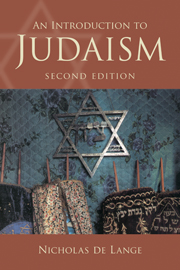Book contents
- Frontmatter
- Contents
- List of illustrations
- List of tables
- Preface
- Preface to the second edition
- Chronology
- Map of the Jewish world in 1930
- Map of the Jewish world in the 2000s
- 1 THE JEWS IN THE WORLD
- 2 THE JEWISH PEOPLE AND ITS PAST
- 3 JEWISH BOOKS
- 4 THE JEWISH RELIGION
- 5 THE FAMILY
- 6 THE COMMUNITY
- 7 GOD AND THE JEWISH PEOPLE
- 8 OBJECTIVES
- 9 JUDAISM AND THE FUTURE
- Glossary
- Further reading
- Index
8 - OBJECTIVES
Published online by Cambridge University Press: 05 September 2014
- Frontmatter
- Contents
- List of illustrations
- List of tables
- Preface
- Preface to the second edition
- Chronology
- Map of the Jewish world in 1930
- Map of the Jewish world in the 2000s
- 1 THE JEWS IN THE WORLD
- 2 THE JEWISH PEOPLE AND ITS PAST
- 3 JEWISH BOOKS
- 4 THE JEWISH RELIGION
- 5 THE FAMILY
- 6 THE COMMUNITY
- 7 GOD AND THE JEWISH PEOPLE
- 8 OBJECTIVES
- 9 JUDAISM AND THE FUTURE
- Glossary
- Further reading
- Index
Summary
In this chapter we approach the question ‘How can one be a good Jew, and what is the ultimate purpose of it?’ Simple answers are available, but none holds the field. Consequently our search must be wide ranging, and we shall begin by looking at some biblical answers, and at the ways they have been interpreted and applied in subsequent tradition. What is the characteristic that a Jew should aim to embody, above all others, in his or her life?
HOLINESS
‘Now if you listen to my voice and keep to my covenant you will become my special possession out of all the peoples, because the whole world is mine. You shall be mine, a kingdom of priests and a holy nation’ (Exodus 19:5–6). These words, spoken through Moses to the people Israel at Mount Sinai, indicate a key meaning of holiness: Israel is separated from the other peoples and dedicated to the service of God, just as priests are separated from other people and dedicated to his service. ‘Holy’ in Hebrew is kadosh; ‘holiness’ is kedushah: the words combine the twin concepts of separation and dedication. The English word that most closely combines these two meanings is ‘special’, although ‘special’ will not usually do as a translation of kadosh. The ‘sanctification’ or dedication of the people is mentioned very often in the prayers.
- Type
- Chapter
- Information
- An Introduction to Judaism , pp. 182 - 207Publisher: Cambridge University PressPrint publication year: 2009

